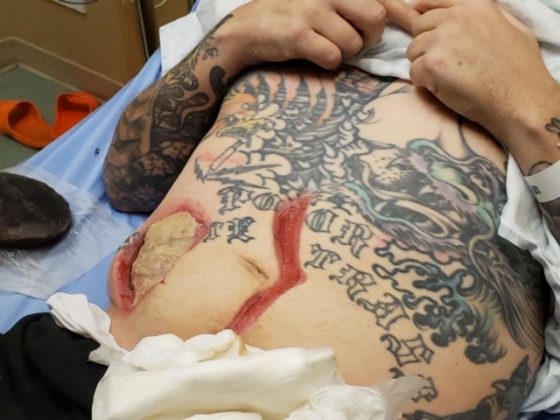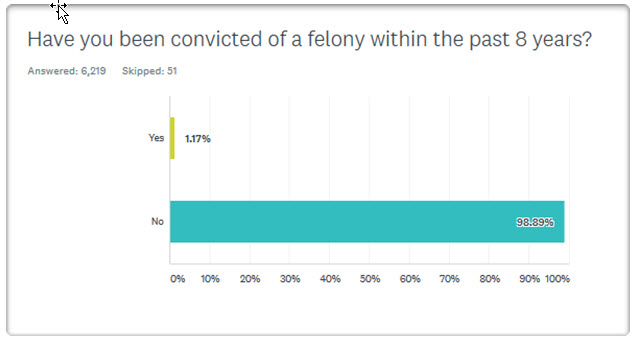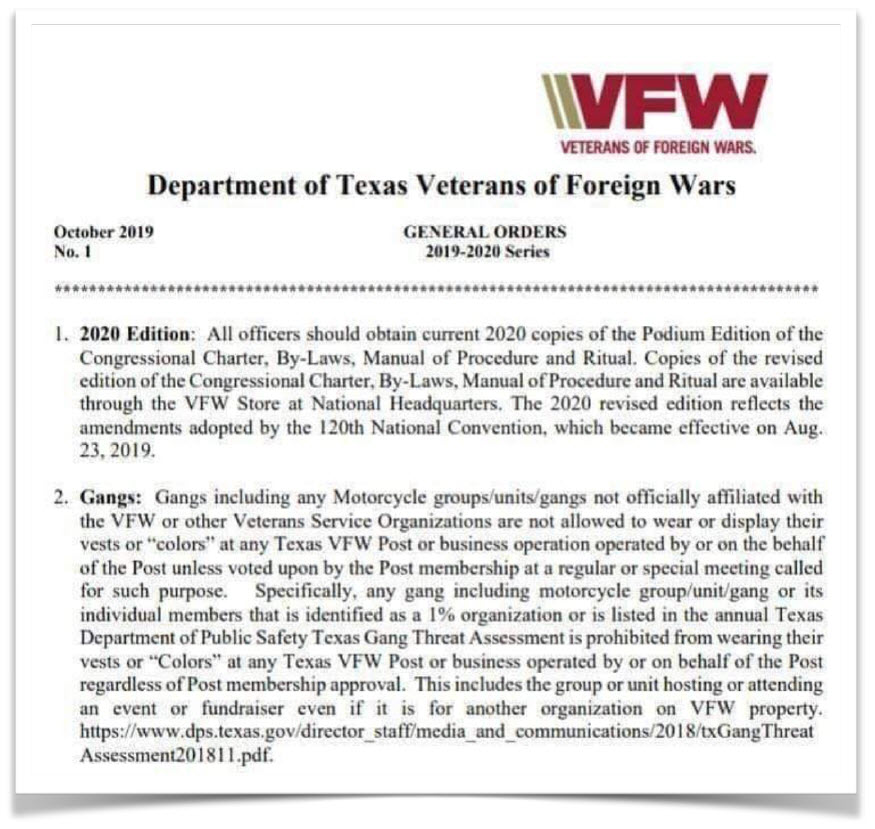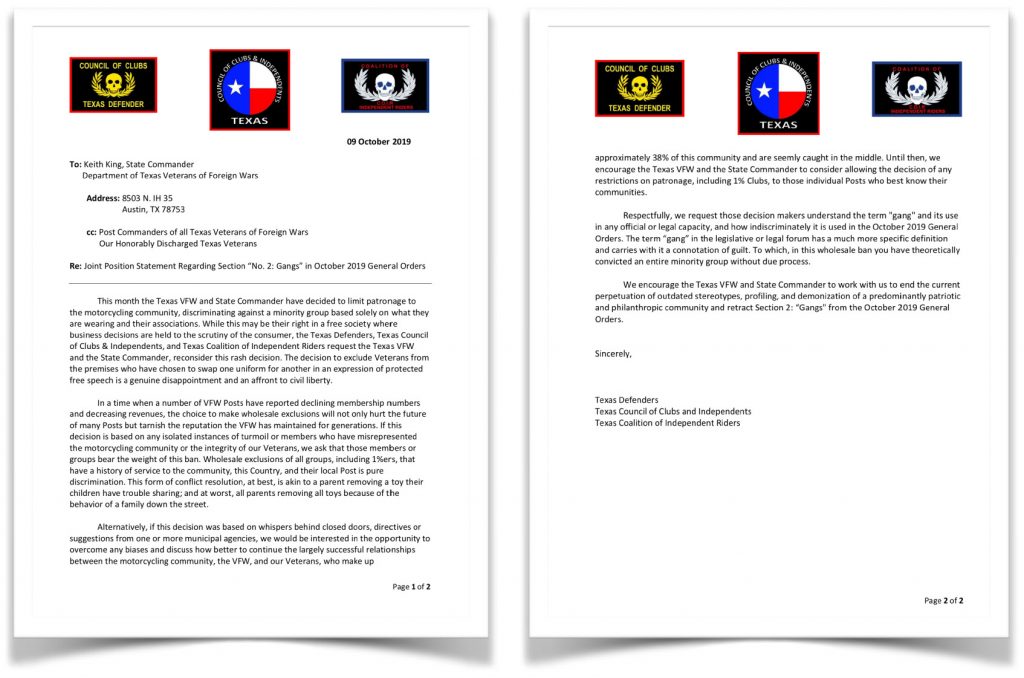To request a login to this website, please contact the webmaster at webmaster@coloradococ.com
Author Archives: admin
Next Colorado COC Meeting – Front Range
The next meeting for the Front Range Colorado COC Will be held;
October 13th, 2024 @ NOON
LOC:
VFW Post 4171
15625 W 10th Ave, Golden, CO 80401-3907, US
Open to members and invited guests only.
Idaho DMV Unconstitutionally Denies Service For Motorcycle Club Colors
By omceric On July 2nd, 2020, a Canyon County, Idaho Sheriff denied a prospect for the Vagos Motorcycle Club access to the Canyon County Department of Motor Vehicles to renew his license. It has been long established that an employee of the government is constitutionally prohibited from denying access to an individual wearing motorcycle club colors, or […]
Source:: Idaho DMV Unconstitutionally Denies Service For Motorcycle Club Colors
Idaho DMV Unconstitutionally Denies Service For Motorcycle Club Colors
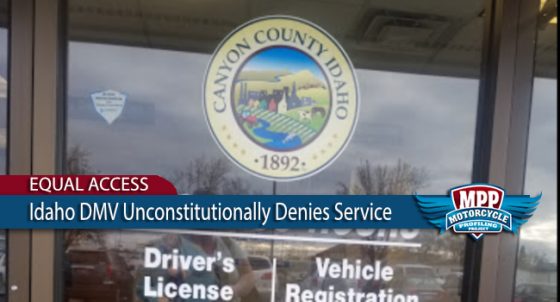
On July 2nd, 2020, a Canyon County, Idaho Sheriff denied a prospect for the Vagos Motorcycle Club access to the Canyon County Department of Motor Vehicles to renew his license. It has been long established that an employee of the government is constitutionally prohibited from denying access to an individual wearing motorcycle club colors, or otherwise discriminating against them in any way. The actions of the Canyon County DMV are a blatant violation of the 1st and 14th Amendments and expose public officials to liability under 42 USC Section 1983. The Canyon County Sheriff’s Department and DMV should immediately cease and desist the practice of denying access to individuals engaged in protected expressive conduct, such as wearing motorcycle club colors. The actions of the Canyon County DMV, although not in direct violation, are 100% inconsistent with the new law prohibiting motorcycle profiling that went into effect July 1st, 2020.
The Details
ABATE of Idaho reported this incident to the MPP and provided the following statement from the individual denied his Constitutional right of expression:
“I, Justin Burchard, on the 2nd of July 2020, went to Canyon County DMV in Caldwell ID. At approximately 8:35 am I walked up to entrance and was stopped by an officer [Canyon County Sheriff] and told I could not enter the facility wearing my motorcycle club vest. I did not argue with the officer… His description was Caucasian male in his mid 40’s dark hair slender build. I felt it was a violation of my rights.”
Denying Access Is Unconstitutional
Cohen v. California (1971) established that individuals have a 1st Amendment right to wear clothing which displays writing or designs in public spaces. The Supreme Court concluded that an individual wearing a shirt reading “F*#K THE DRAFT was protected expression in a courthouse. See Cohen v. California, 403 U.S. 15 (1971).
In Sammartano v. First Judicial District Court (2002) the 9th Circuit Court of Appeals applied Cohen and said that wearing of motorcycle club colors in a government building is protected speech under the 1st Amendment. Arguments relating to intimidation or the potential for violence based on general stereotypes do not overwhelm this right. See Sammartano v. First Judicial District Court, 303 F.3d 959 (9th Cir.2002).
In Coles v. Carlini (2015), relying on Supreme Court precedent, a US District Court recently concluded that the government may not impose restrictions on an individual solely because of displaying membership in a motorcycle club. Importantly, these protections extend to members of clubs that law enforcement has labeled gangs or criminal organizations.
There is “no evidence that by merely wearing [motorcycle club] “colors,” an individual is “involved in or associated with the alleged violent or criminal activity of other [motorcycle club] members. It is a fundamental principle that the government may not impose restrictions on an individual “merely because an individual belong[s] to a group, some members of which committed acts of violence.” In fact, the Supreme Court has long “disapproved governmental action . . . denying rights and privileges solely because of a citizen’s association with an unpopular organization.” Healy v. James, 408 U.S. 169, 185-86 (1972) (See Coles v. Carlini, US District Court for the District of New Jersey, Civil No. 10-6132 OPINION, 9/30/2015, p.28)
Federal Courts say, “On balance, a motorcycle club member’s hardship in not being able to express their views and the public interest in protecting speech outweigh the Government’s interest in suppressing an intimidating symbol.” 1 “Though the symbol may at times function as a mouthpiece for unlawful or violent behavior, this is not sufficient to strip speech of its First Amendment protection.” 2 Prohibiting speech of this nature constitutes an attack on a particular viewpoint.
- Ramon Rivera v. Carter, ATF, Case No. 2:09-cv-2435 (C. D. 2009)
- Rivera citing Ashcroft v. Free Speech Coalition, 535 U.S. 234, 253 (2003) (“The mere tendency of speech to encourage unlawful acts is not a sufficient reason for banning it. . . .First Amendment freedoms are most in danger when the government seeks to control thought or to justify its laws for that impermissible end.”)
The post Idaho DMV Unconstitutionally Denies Service For Motorcycle Club Colors appeared first on Motorcycle Profiling Project.
Idaho DMV Unconstitutionally Denies Service For Motorcycle Club Colors
On July 2nd, 2020, a Canyon County, Idaho Sheriff denied a prospect for the Vagos Motorcycle Club access to the Canyon County Department of Motor Vehicles to renew his license. It has been long established that an employee of the government is constitutionally prohibited from denying access to an individual wearing motorcycle club colors, or otherwise discriminating against them in any way. The actions of the Canyon County DMV are a blatant violation of the 1st and 14th Amendments and expose public officials to liability under 42 USC Section 1983. The Canyon County Sheriff’s Department and DMV should immediately cease and desist the practice of denying access to individuals engaged in protected expressive conduct, such as wearing motorcycle club colors. The actions of the Canyon County DMV, although not in direct violation, are 100% inconsistent with the new law prohibiting motorcycle profiling that went into effect July 1st, 2020.
The Details
ABATE of Idaho reported this incident to the MPP and provided the following statement from the individual denied his Constitutional right of expression:
“I, Justin Burchard, on the 2nd of July 2020, went to Canyon County DMV in Caldwell ID. At approximately 8:35 am I walked up to entrance and was stopped by an officer [Canyon County Sheriff] and told I could not enter the facility wearing my motorcycle club vest. I did not argue with the officer… His description was Caucasian male in his mid 40’s dark hair slender build. I felt it was a violation of my rights.”
Denying Access Is Unconstitutional
Cohen v. California (1971) established that individuals have a 1st Amendment right to wear clothing which displays writing or designs in public spaces. The Supreme Court concluded that an individual wearing a shirt reading “F*#K THE DRAFT was protected expression in a courthouse. See Cohen v. California, 403 U.S. 15 (1971).
In Sammartano v. First Judicial District Court (2002) the 9th Circuit Court of Appeals applied Cohen and said that wearing of motorcycle club colors in a government building is protected speech under the 1st Amendment. Arguments relating to intimidation or the potential for violence based on general stereotypes do not overwhelm this right. See Sammartano v. First Judicial District Court, 303 F.3d 959 (9th Cir.2002).
In Coles v. Carlini (2015), relying on Supreme Court precedent, a US District Court recently concluded that the government may not impose restrictions on an individual solely because of displaying membership in a motorcycle club. Importantly, these protections extend to members of clubs that law enforcement has labeled gangs or criminal organizations.
There is “no evidence that by merely wearing [motorcycle club] “colors,” an individual is “involved in or associated with the alleged violent or criminal activity of other [motorcycle club] members. It is a fundamental principle that the government may not impose restrictions on an individual “merely because an individual belong[s] to a group, some members of which committed acts of violence.” In fact, the Supreme Court has long “disapproved governmental action . . . denying rights and privileges solely because of a citizen’s association with an unpopular organization.” Healy v. James, 408 U.S. 169, 185-86 (1972) (See Coles v. Carlini, US District Court for the District of New Jersey, Civil No. 10-6132 OPINION, 9/30/2015, p.28)
Federal Courts say, “On balance, a motorcycle club member’s hardship in not being able to express their views and the public interest in protecting speech outweigh the Government’s interest in suppressing an intimidating symbol.” 1 “Though the symbol may at times function as a mouthpiece for unlawful or violent behavior, this is not sufficient to strip speech of its First Amendment protection.” 2 Prohibiting speech of this nature constitutes an attack on a particular viewpoint.
- Ramon Rivera v. Carter, ATF, Case No. 2:09-cv-2435 (C. D. 2009)
- Rivera citing Ashcroft v. Free Speech Coalition, 535 U.S. 234, 253 (2003) (“The mere tendency of speech to encourage unlawful acts is not a sufficient reason for banning it. . . .First Amendment freedoms are most in danger when the government seeks to control thought or to justify its laws for that impermissible end.”)
The post Idaho DMV Unconstitutionally Denies Service For Motorcycle Club Colors appeared first on Motorcycle Profiling Project.
Source:: Idaho DMV Unconstitutionally Denies Service For Motorcycle Club Colors
Colorado Sheriffs Cover-Up Shooting Hells Angel In Stomach
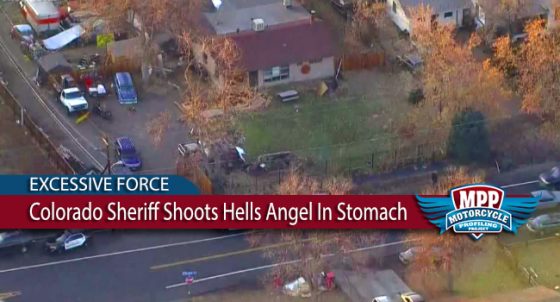
A video recently released capturing Colorado law enforcement discussing shooting a Hells Angel during a traffic stop without cause was not a mere threat. Although law enforcement has made every attempt to conceal the truth through fictitious statements to the mainstream media, a Colorado Sheriff attempted to kill another unarmed Hells Angel a little more than a year later by shooting him in the stomach while serving a warrant in late 2019. Until now, this story has not been fully told. The victim was in a coma following the shooting while his location was being being hidden from his attorney and family by law enforcement for 13 days before a court order was granted by a judge, not surprisingly at the absurd objection of prosecutors and law enforcement. The situation was very uncertain. But recent revelations confirming a broader policy of targeting Hells Angels with an explicit willingness to kill without cause demands widespread attention and public outrage. So this story must now be told.
The National Council of Clubs (NCOC), representing the legitimate interests of motorcycle clubs and their members nationwide, stands in unified opposition to law enforcement targeting and attempting to murder members of motorcycle clubs. The NCOC hopes lives are saved by holding the officer(s) involved accountable, both for the shooting and the blatant lies relayed to the public in an obvious attempt to downplay the severity of law enforcement actions. Motorcycle Profiling is real and the loss of life is the ultimate impact.
The Basic Details While serving one of 19 warrants in Jefferson County, Colorado on November 7th, 2019, a SWAT team officer shot a member of the Hells Angels Motorcycle Club (HAMC) in the stomach with a shotgun round intended to breach a locked door (not shoot a human being) when he opened the door unarmed to peacefully greet approaching officers. Independent of the many unanswered questions that remain, the Jefferson County Sheriff’s Office (JCSO) reported that the suspect sustained a non-life threatening injury. That was a blatant lie. The victim almost died.
Law enforcement’s version of events.
As reported by law enforcement officials to NBC affiliate 9news.com on November 7th, 2019:
- A member of the Hells Angels Motorcycle Club was shot and injured by a breaching shotgun round while a Jefferson County Regional SWAT Team was executing a search and arrest warrant issued out of Denver early Thursday, November 7th, 2019, according to the JCSO. The warrant was from the ATF and was among 19 executed on November 7th, 2019.
- A spokesperson for the JCSO said the suspect opened the door right as a SWAT team member fired the round and was struck by it.
- The suspect suffered a non-life threatening injury and was transported to a hospital, according to the JCSO. Law enforcement lied! The victim almost died. Contrary to official JCSO’s statements, the injuries sustained by the victim were life- threatening. His condition continually worsened. It was feared that the victim, a member of the HAMC in Denver named Dusty Ullerich, was going to die. According to statements made to the NCOC by individuals present, after his location was secured through a court order, family members and a number of club brothers were allowed access to a secure federal medical facility to visit Dusty because medical professionals feared he was going to die due to internal bleeding as a result of being shot in the stomach. Downplaying the severity of Dusty’s injuries is unethical, disingenuous, and abhorrent. Regardless of any other circumstances, misinforming the public about life-threatening injuries sustained by any individual at the hands of law enforcement is a breach of public trust which further erodes the relationship between law enforcement and those they are duty bound to protect.
Although Dusty stabilized after being in a coma, the fact that the injuries he sustained were life-threatening is an important detail that the public has a right to know and that law enforcement has an ethical duty not to lie about. Adding insult to injury, before he was fully recovered, on Christmas Eve 2019 law enforcement officers rushed into his already secured hospital room, placed him under arrest, and announced that he was being charged under the state organized crime law. They then took him to Denver County jail in a wheelchair. Dusty bonded out a few days later and is at home with an ankle monitor awaiting trial.
Expert Opinion.
Why was it necessary to fire a breaching round in the first place? Dusty has no criminal record and he has never been convicted of a violent crime. He was home alone with his wife and obviously had no intention of resisting based on the fact that he opened the door unarmed to greet them. What is the probability of the officer firing a breaching round at the exact moment Dusty was opening the door? Based on the opinion of one combat military veteran with extensive experience in breaching residential dwellings, it’s highly improbable. Bobby Colella, retired Army 1st Sergeant and NCOC participant, breached countless residential dwellings in a war theater and not once was an occupant struck by a breaching round when they opened the door. How far away was the Sheriff when he shot the breaching round? Colella explains that “breaching rounds of the sort used in this instance are low velocity and must be fired at very close range. Within a foot or two. It makes more sense that the officer was startled, despite training to control impulsive deadly force responses when startled or stressed.” If the sheriff deputy was farther away, that makes a non-accidental shooting even more likely. From farther away, shooting Dusty, not breaching the door, is the only logical intent of the shot.
A Call To Action
What’s happening in Colorado is a microcosm of a national epidemic. The evidence is clear. Under the status quo, motorcycle clubs are targeted as a matter of policy to the degree that killing a Biker without cause is an acceptable method of law enforcement. Discrimination and profiling against motorcyclists demands immediate public policy attention at the state and national level. The issue is literally one of life and death.
HELP END MOTORCYCLE PROFILING!
CLICK HERE AND TAKE THE NATIONAL MOTORCYCLE PROFILING SURVEY
https://www.facebook.com/636411183161947/posts/1926286147507771/
The post Colorado Sheriffs Cover-Up Shooting Hells Angel In Stomach appeared first on Motorcycle Profiling Project.
Idaho Passes Anti-Motorcycle Profiling Law
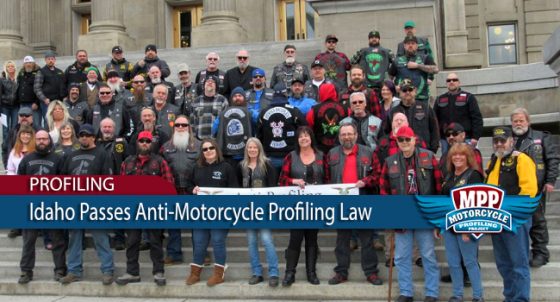
In the midst of the global corona virus pandemic there is not much “good news”. But for motorcyclists in Idaho there is a sliver of positivity in a sea of crisis. On March 18th, 2020 the state of Idaho became the 4th state to pass a law addressing the issue of motorcycle profiling. Awaiting the governor’s signature, S 1292, sponsored by Representative Robert Anderst, passed the Idaho House of Representatives on a 37-30 vote after previously passing the Senate 25-9.
S 1292 defines the term “motorcycle profiling” and prohibits the practice. And like the 3 states that have previously addressed the issue- Washington State (2011), Maryland (2016) and Louisiana (2019)- S1292 doesn’t allow monetary claims against law enforcement. The Federal Civil Rights Act remains the mechanism of monetary relief for victims of profiling. Rather, state anti-motorcycle profiling legislation provides a mechanism for targeted individuals to receive dismissals and exclusion of evidence based on an illegal stop, in addition to enhanced law enforcement training intended to curtail the discriminatory practice.
The law in Idaho is the direct result of a 5-year long grassroots effort led by Idaho ABATE. Idaho ABATE is a quintessential example of the democratic process at work. With persistence and preparation, legislative opposition can be reversed. Legislators deal with hundreds/ thousands of pieces of legislation annually. Idaho ABATE did not allow previous failures since 2017 to discourage the legislative effort. Instead of giving up, Idaho ABATE persisted and was eventually successful educating and gaining the support of legislators that previously opposed the idea.
The Motorcycle Profiling Project congratulates Idaho ABATE, Representative Anderst, and those that supported the effort- you know who you are! Working with you was a pleasure!
Stay healthy. Stay safe. And Fight The Good Fight!
The post Idaho Passes Anti-Motorcycle Profiling Law appeared first on Motorcycle Profiling Project.
A Blueprint For Successfully Protesting “No Motorcycle Colors”
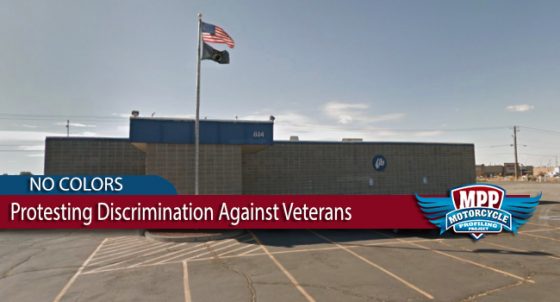
A Blueprint For Successfully Protesting “No Motorcycle Colors” Nationwide the act of law enforcement coercing private establishments to prohibit motorcycle club-related clothing and paraphernalia has grown to epidemic levels. The National Council of Clubs, representing motorcycle clubs and their member’s legitimate interests in all 50 states, stands in opposition to law enforcement coercion and encourages motorcyclists to organize and fight back!
A recent example in the state of Pennsylvania not only highlights the issue, but also provides a viable blueprint for successfully reversing law enforcement motivated discrimination in public accommodations. Ephrata Police attempted to coerce a local Elks Lodge into breaking a contract with the Lancaster County Motorcycle Club (LCMC) that planned on holding their annual Halloween party to benefit the Ronald McDonald House. Fortunately, the LCMC, the NCOC, and Motorcycle Profiling Project (MPP), organized a successful campaign blocking law enforcement’s efforts.
The Background
Lancaster County Motorcycle Club is “a family friendly group using our love of riding motorcycles to help charities and benefits in our community.” LCMC as a collective, have never had any interactions with any law enforcement agency, and has references from many facilities that have hosted them, or that they participated in events with. On August 15th, 2019, LCMC signed a rental contract with the Elks Lodge 1933 to hold their annual Halloween party to take place on October 26, 2019. LCMC had hired a band, and planned on renting a taxi for any intoxicated drivers, and had a motorcycle trailer on standby as well. With food, entertainment, and safety measures in place, everything was going as planned, and shaping up to be a successful charity fundraiser. That is until the Ephrata Police decided to get involved.
State Actor Discrimination
On September 23rd, a board member of the Elks Lodge informed LCMC that their party was canceled at the behest of Lt. Christopher McKim of the Ephrata Police Department. Lt. McKim, acting under the color of state law in a official capacity, and who is also a member of the Elks lodge, had several conservations with a board member and the president of the lodge, “advising” them “not to have the party because of the possible ramifications that could happen from it.” The board members of the lodge decided to have a meeting to discuss what they believed was a directive from the local police department. Lt. McKim told the board members that he was ‘tipped off’ by agencies that were higher than his. Lt. McKim falsely claimed that LCMC had ties to a Motorcycle ‘Gang’, and employed a scare tactic of asking the lodge what they would do in the event that something ‘bad’ happened. Based on the erroneous and sensationalized misinformation that was presented to them, the Elks Lodge decided to cancel the planned event.
LCMC Pushes Back
Lancaster County Motorcycle Club was not happy about the slanderous information that was being spread about them, and made the decision to push back. The President of LCMC made several phone calls to the president of the Elks Lodge, as well as too Lt. McKim seeking an explanation as to why he would illegally influence a private business under the color of the law.
After several days and multiple attempts unanswered, LCMC President contacted the NCOC. On September 27th, 2019, I called Lt. McKim and requested an interview. Initially, he stated that he did not have time, and did not know what the questions were going to be in reference too. I informed him that I would be writing an article about his illegal actions, and would like to get quotes and/or his side of the story. Once this information was presented, Lt. McKim made time and decided to speak with this writer.
Ephrata Police Backpedal
Lt. McKim denied pressuring the Elks Lodge to cancel event, stating that “we”, the Ephrata Police, “just wanted them to be aware of the situation, aware of the connection.” He stated that he had received information from other confidential sources that “trouble can arise, not that it will arise.” He stated that the police department contacts any venue that is holding an event discusses how they would handle the situation “if anything bad happened.” When asked whether he, or the Ephrata Police Department is against the Elks Lodge hosting the LCMC parties, he responded “NO, not at all.”
While this writer was informing the LCMC President of the conservation with Lt. McKim, the Lt. coincidentally decided to return the President’s phone call. Armed with this new information, LCMC was able to secure an audience with the Elks Lodge board members to discuss the issue of having their party cancelled.
The Meeting
Majority of the LCMC, as well as this writer, were present for a meeting with board of the Elks Lodge. Many of tired and true misconception about Motorcycle Clubs were brought up in the meeting. One board member, a retired Ephrata Police officer, even insinuated that if a certain Motorcycle Club was not invited, that there was going to be violence. This same board member reaffirmed what was believed when he stated that “we were basically told not to have the party.”
Armed with statistical data and evidence, as well as compelling personal and collective stories, LCMC was able to able to convince the board members that having the party would not result in any violence, and that Lt. McKims mischaracterization of them was exactly that. After the meeting LCMC was informed that all but one board member voted to allow the party to take place as originally planned.
The Party
On October 26th, LCMC held their Halloween party as planned. There were zero incidences of violence, zero complaints from neighbors, and zero involvement from any law enforcement agency. Most importantly, proceeds were able to benefit the Ronald McDonald House, which helps the families of sick children at Penn State Milton S. Hershey Children’s Hospital.
This is yet another example of what can be accomplished when the Motorcycle Club community works together for Our 1st Amendment Rights.
The post A Blueprint For Successfully Protesting “No Motorcycle Colors” appeared first on Motorcycle Profiling Project.
New Jersey Tramples on 1st Amendment To Target Pagan’s MC
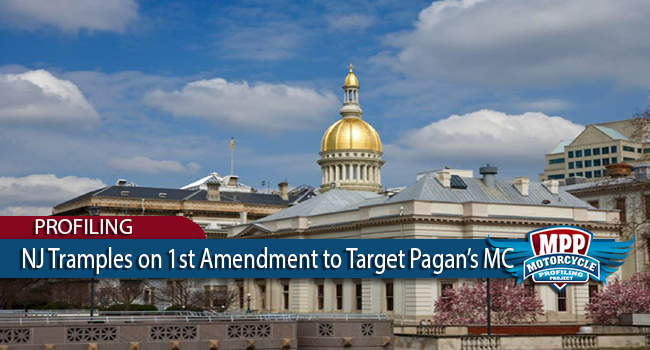
The New Jersey State Commission of Investigations recently held public hearings on the Pagan’s Motorcycle Club (PMC) and it was business as usual. 1The NJSCI, in a trend being repeated by government and media sources nationwide, continued the process of eroding and ignoring the 1st Amendment in an attempt to vilify motorcycle clubs, in this instance the PMC due to the club’s alleged rapid growth recently. The actions of the few do not, and should not, dictate policy towards an entire demographic. Yet, that is the exact tactic being employed by the NJSCI by exploiting and sensationalizing the alleged actions of a few members in an attempt to encourage policy condemning the entire organization. That is simply not how the 1st Amendment works.
Same old song and dance
The NJSCI hearing was intended to expose policymakers to the allegedly growing threat presented by the PMC. The NJSCI has no power to prosecute. They do, however, provide guidance to policymakers that directly influence legislation and law. Ignoring the fundamental liberties embodied in the 1st Amendment, the NJSCI presented a familiar narrative echoing a biased and inaccurate stereotype by presenting as evidence actions of individual members in an attempt to condemn all PMC members. Moreover, many of the examples presented have not been subjected to judicial scrutiny or due process. Although no one goes to prison as a direct result, the NJSCI directly influences legislation without the requirement that an individual is innocent until proven guilty.
The false 1% narrative
NJSCI investigative agent Edwin Torres begins by advancing the falsehood that being a 1%’ER is synonymous with being a criminal. This assertion is an attempt to condemn an entire community and constitutionally protected symbol and association.
“Make no mistake. They are gangs”, says Torres. He then breaks into the apocryphal AMA narrative dating back to Hollister, California in 1947 in which the AMA declared that 1% of motorcyclists were not law-abiding citizens. Torres testified that 1%’ERS “wear a patch advertising that they are not law-abiding citizens.”
The assertion is ridiculous to members of the 1% club community. At worst, 1’ERS are advertising rebellion against mainstream society’s rules, not its’ laws. Things like long hair, tattoos, loud motorcycles, and parties.
The truth is that 1% clubs are considered elite among clubs, generally with higher levels of commitment and participation requirements, not criminality requirements. 1% clubs are a lifestyle, not a hobby. The truth is that the vast majority of 1%’ERS are employed, many have families, and don’t have criminal records. The statistics strongly dispute claims of criminality.
NJSCI claims about women are offensive and false
In an attempt to provoke fear in policymakers and the public, NJSCI investigators assert women are abused and mistreated. Nicole McCann, investigative analyst for NJSCI testified, “According to the Pagan Motorcycle Club, women are below dogs. Women are treated like their property … shared sexually among the group. They are typically given as many drugs or drinks as they want.”
This assertion is highly offensive to PMC members and their Ol’ Ladies. One self-proclaimed proud Pagan Ol’ Lady writes to the MPP: “Lower than dogs?!” Come on! My Pagan Ol’Lady sisters are top quality wives, girlfriends, and mothers! My property patch indicates that I’m loved, valued, and cherished by my man. And in return, we honor, love and respect our men.”
Although not as sensational as Hollywood’s version of biker culture, the claims regarding the intrinsic abuse of women are simply not true.
Assertions regarding drug use and inherent criminality are false
The NJSCI also claims that 90% of Pagan’s MC members do narcotics, in addition to all being criminals as signified by the 1% patch. Members also dispute this claim. One proud PMC member, family man, business owner, and law-abiding citizen writes the MPP, “Any intelligent person who believes this line of crap these officials are spewing is just as hypocritical and judgmental as those fabricating this nonsense. Talk about fake news and slanderous rhetoric! The percentage of club members who actually abuse drugs and commit crimes is far less than statistics have proven in law enforcement, clergy, and even government. The Doctors and priests molesting and abusing children and corruption in government and law enforcement is public knowledge. The men and women in motorcycle clubs around the world are widely comprised of hard-working, family loving, community support, and yes, law-abiding citizens from ALL walks of life. Lets face the facts and stop the spread of fake news on all levels. Get real.”
Statistically, very few 1%’ERS are criminals
Constitutional implications
Torres is advancing a perception about all PMC members and 1%’ERS based on the actions of individual members. Certainly, individuals in clubs commit crimes. Some individuals in all large organizations and communities do, including government and law enforcement. But this fact does not mean every member of these groups are criminals.
This blanket assertion of criminality is completely inconsistent with established constitutional principles. And this is not the first time New Jersey law enforcement has attempted to condemn members of the PMC for mere association.
In 2015, a federal court in New Jersey found “no evidence that by merely wearing Pagan’s “colors,” an individual is “involved in or associated with the alleged violent or criminal activity of other Pagan’s members. It is a fundamental principle that the government may not impose restrictions on an individual “merely because an individual belong[s] to a group, some members of which committed acts of violence.” In fact, the Supreme Court has long “disapproved governmental action . . . denying rights and privileges solely because of a citizen’s association with an unpopular organization.” Healy v. James, 408 U.S. 169, 185-86 (1972).
Condemning any person “who wears the insignia of the Pagan’s motorcycle club, without regard to or knowledge of that individual’s specific intent to engage in the alleged violent activities committed by other members, is antithetical to the basic principles enshrined in the First Amendment and repugnant to the fundamental doctrine of personal guilt that is a hallmark of American jurisprudence.” see Coles v. Carlini 162 F.Supp.3d 380 (2015)
1 https://www.njleg.state.nj.us/media/mp.asp?M=A/2019/CIR/1023-1000AM- M0-1.m4a&S=2018
The post New Jersey Tramples on 1st Amendment To Target Pagan’s MC appeared first on Motorcycle Profiling Project.
Texas Bikers Stop VFW’s No MC Colors Policy
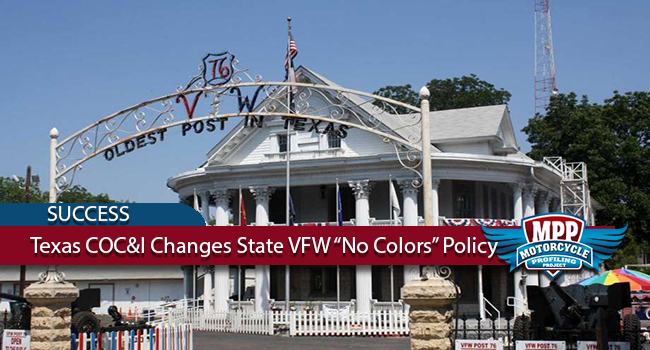
The National Council of Clubs, representing the interests of motorcycle clubs and thousands of their members in every state in America, is both concerned and appalled at recent reports of Veterans organizations, including some VFW, American Legion, and Eagles posts, among others, denying access to individuals expressing membership in motorcycle clubs.
So what’s the solution? The Texas Council of Clubs & Independents recent campaign in response to a policy of discrimination announced by the state VFW serves as an example of a successful strategy for others facing similar acts of discrimination by private Veterans organizations in their states.
Texas VFW General Orders of discrimination
Dated October 2019, the Department of Texas VFW sent General Orders to all VFW Posts throughout the state outlining a new written policy which includes a provision excluding all 1% MC members, employing gang labeling, from VFW events and property.
The TCOC&I quickly became aware of the General Orders through local VFW posts in numerous areas of the state and immediately began a campaign responding to the new policy of discrimination. Motorcycle clubs have a long history of having events at VFW posts, many motorcyclists are members, and relationships are strong in many places in Texas, as they are throughout America.
TCOC&I uses social media to apply pressure
Representatives of the TCOC&I began spreading the VFW letter through social media channels. Thousands in Texas and across the country became aware. On October 9th, a direct response from the TCOC&I in the form of a formal letter was sent to the Texas VFW outlining the community’s request that the policy be reversed. The TCOC&I emphasized the historical ties between the MC community and VFW’s throughout Texas. 38% of the club community are Veterans, more than five times the national average. MC meetings, benefits, and social events are a common occurrence.
According to a TCOC&I representative, this letter resulted in a meeting between representatives of both the Texas VFW and TCOC&I, including the local Austin VFW President. On Saturday, October 12, 2019, the TCOC&I emphasized the importance of not allowing the actions of the few influence how the VFW regards all motorcycle clubs, including 1%’ERS, and how they are treated. The TCOC&I also made a formal request for written explanation of the specifics that led to the General Orders and confirmation of a policy reversal. VFW representatives committed to bringing the TCOC&I’s concerns to Keith King, Texas VFW State Commander.
The Texas VFW reverses policy of discrimination
On October 22, 2019 Paul Landers, representing the TCOC&I, reached out to the Texas VFW for an update or statement following the October 12 meeting. Landers was notified that King would meet the following day to personally discuss the General Orders at Issue.
After meeting on October 23 the VFW State Commander opened his mind and listened, according to. Landers.
“King explained that the policy was due to publicized incidents of violence and 1% MC’s in Texas. But after listening to our perspective he changed his perspective. The actions of the few should not impact the rights of the whole. King agreed to a written policy change that does NOT exclude MC’s and 1% clubs from VFW property”, says Landers.
The Texas VFW Commander King writes, “The Texas VFW leadership met with representatives of the Texas Council of Clubs & Independents about General Order #2 issued October 2019 and received input from them that further clarification was requested to separate “Gangs” from MC’s. Motorcycle Clubs are Not Street Gangs. This was a very informative meeting with all attending sharing valuable information concerning the groups
We all agreed that our organizations did many good things for the communities in their areas. We all agreed that respect for one another is vital. As the original General Order stated, posts will have the right to permit the groups they have good working relationships with on their property. Notice that this means they will have the right to wear their patch as well if the post allows it. We all agreed to police ourselves. We believe that by working together we can strengthen our community involvement as many riders are in fact veterans themselves.
We hope this clears up the situation concerning motorcycle groups and the VFW in Texas.”
A model response to discrimination
The TCOC&I serves as a model example on how to respond to Veteran organization discrimination against the motorcycling community.
First, social media channels were flooded with the VFW’s General Orders in order to increase awareness and generate independent complaint streams. The more individuals that reach out and complain means the more leverage an official complaint will have.
Second, an official complaint and request for policy reversal was drafted and sent to the Texas VFW. The complaint outlined the close connection between MC’s and Veterans and argued the VFW is profiling and discriminating against the very people they exist to serve.
Third, meetings were arranged with VFW representatives in order to resolve the issue. Capable spokespersons persuaded the VFW to not punish all MC members for the actions of the few. The final result was a reversing a discriminatory policy.
The entire TCOC&I campaign was implemented and completed within days of the original letter being sent by the VFW. The campaign was cost-free and 100% relied upon active volunteer participation.
Conclusions
The shortsighted policy of excluding MC’s from Veteran’s organizations is appalling and unacceptable. Many in the MC community are loyal veterans, and Americans, and should not be the target of discrimination at home, particularly at the hands of other Veterans.
The TCOC&I blueprint can be modeled and implemented anywhere, in any state. No need to recreate the wheel.
Silence is consent.
The post Texas Bikers Stop VFW’s No MC Colors Policy appeared first on Motorcycle Profiling Project.


